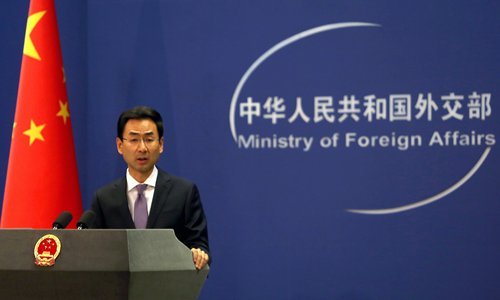HOME >> CHINA
China slams US global bully tactics
By Wang Cong and Chen Qingqing Source:Global Times Published: 2019/6/5 21:18:40
Other countries will have less faith in US-led rules, motives

Chinese Foreign Ministry spokesman Geng Shuang answers questions at a press conference at the Foreign Ministry in Beijing. Photo: IC
Top Chinese government advisers on Wednesday harshly criticized US untrustworthiness on the global stage, as US officials continue what is widely described as bullying actions against not just China but many other countries, including their close allies, over trade and other issues.
The criticism from top Chinese experts from the country's foremost think tank comes as Chinese officials also mounted a hardened approach in recent days to push back US accusations and criticism against China, and blamed US officials for repeatedly backtracking on and undermining trade talks.
"The US has been flip-flopping all along on trade negotiations with China, but also on many other international affairs," Zhou Mi, a research fellow at the Chinese Academy of International Trade and Economic Cooperation of the Ministry of Commerce, told a forum on China-US trade talks in Beijing.
At the forum, hosted by the Chinese Academy of Social Sciences, the country's top think tank, experts highlighted how the US undermined its global credibility by bullying other countries and flip-flopping on many global issues, from climate change to the Iran nuclear deal.
Losing trust
"If the US continues to undermine its international trustworthiness, its influence on reforming the current trade and economic system or pushing for a new one will diminish," Zhou said.
"Other parties will have less faith in the US-led international rules and its motives," Zhou noted.
Even as US officials have repeatedly accused China of backtracking on trade talks, despite China's fact-based rebuttal, their credibility has been seriously undermined by a slew of bullying actions against many countries, including the UK, Mexico and India.
In the UK, visiting US President Donald Trump has been slammed for meddling in the country's domestic issues, by wading into hot-button issues like a prime ministerial race and Brexit.
He also drew a backlash for trying to pressure UK officials into opening the country's government-run health system to US firms.
With Mexico, US officials have threatened to impose tariffs on products from its southern neighbor if the country does not help stop illegal immigrants from entering the US.
With India, they have announced an end to a special trade treatment, paving the way for imposing tariffs on Indian goods.
US officials even reportedly considered slapping tariffs on products from one of its closest allies, Australia. They are also considering tariffs on auto imports, which could target their European and Asian allies such as Germany and Japan.
"If the US is consistent on one thing, it's the bullying tactic. It not only uses that against China, but also a host of other countries," said Li Yong, deputy chair of the Expert Committee of the China Association of International Trade.
"For its own political purposes, the US has disrupted other countries' economies and the global economy as a whole," Li told the Global Times on Wednesday.
China pushback
Chinese officials have been pushing back US accusations in recent days.
On Sunday, China issued a white paper on its position on the China-US trade talks, revealing in great detail how the US backtracked in negotiations three times.
In March 2018, after the two sides held several rounds of talks and agreed on expanding China's imports of US agricultural and energy products, the US released the so-called Section 301 report criticizing China's trade practices and announced a 25 percent tariff on $50 billion worth of Chinese goods.
In May 2018, just days after the two sides agreed to put the trade war on hold after talks in Washington, the US resumed tariffs on Chinese goods and slapped a tariff of 10 percent on $200 billion of Chinese goods.
And then in the latest case, after several rounds of talks where the two sides agreed on most issues and were close to a deal, the US broke a consensus reached by leaders of the two countries in December 2018 by raising tariffs on $200 billion worth of Chinese goods and blacklisted Chinese telecom firm Huawei.
During the trade talks, the US insisted on "unreasonable" demands, including terms that violate China's sovereignty, according to Wang Shouwen, a vice commerce minister who is part of the Chinese negotiating team.
Wang said at a press briefing on Sunday that even after China overcame difficulties to find pragmatic solutions to many issues raised by the US, "it still wanted a yard after China offered an inch."
In a statement on Tuesday in response to the Chinese white paper, the office of the US Trade Representative (USTR) largely repeated previous accusations that China walked back on promises during the negotiations and conducted unfair trade practices.
"The latest US statement is nothing but singing the same old tune again," Geng Shuang, a spokesperson for the Chinese Foreign Ministry, told a routine press briefing on Tuesday. "Its accusation of China's 'backpedaling' is merely an attempt to distort the facts and blame the innocent party for its own wrongdoing," Geng said.
Posted in: DIPLOMACY